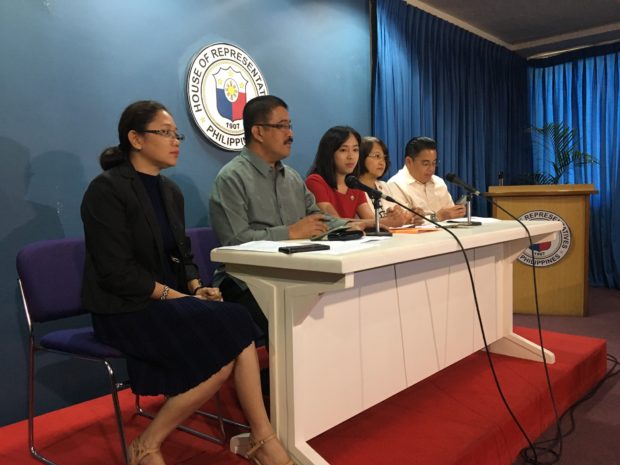Makabayan bloc: TRAIN 2 is pro-rich, anti-poor sequel of tax reform package

Reps. Arlene Brosas, Carlos Isagani Zarate, Sarah Jane Elago, France Castro and Ariel Casilao during the Makabayan bloc’s regular briefing in this file photo. INQUIRER file photo / Vince F. Nonato
Opposition lawmakers from the House Makabayan bloc branded the Duterte administration’s Tax Reform for Attracting Better and High-quality Opportunities (TRABAHO) bill as a “patently pro-rich sequel to the grossly anti-poor and regressive” Tax Reform for Acceleration and Inclusion (TRAIN) Law.
Bayan Muna Rep. Carlos Zarate, ACT-Teachers Reps. Antonio Tinio and France Castro, Gabriela Reps. Emmi de Jesus and Arlene Brosas, Anakpawis Rep. Ariel Casilao, and Kabataan Rep. Sarah Elago’s statement came after the House’s second reading approval of the TRABAHO bill on Tuesday.
The bill is the second tranche of the Duterte administration’s comprehensive tax reform package. It aims to gradually cut the corporate income tax (CIT) rate from 30 percent to 20 percent over 10 years and rationalizes fiscal incentives for foreign and local businesses.
READ: House OKs ‘Trabaho’ bill on 2nd reading
The lawmakers said the TRABAHO bill cannot be “divorced” from TRAIN 1 that affected millions of poor families.
“TRAIN 2 hitches on the back of the notorious first tax reform package, which imposed new and additional excise taxes on oil and other commodities that sent off a tsunami of price hikes harshly affecting millions of poor families,” they said on Wednesday.
They said lowering the CIT to a uniform 20 percent would “disproportionately benefit foreign and big local corporations, which have managed to thrive and reap huge profits under the current 30-percent tax rate.”
“It is detestable that TRAIN 2 proponents are using the Micro, Small, and Medium Industries (MSMEs) to justify the argument for a uniform 20-percent tax rate when, in reality, the big industry players will be the big winners under the scheme,” they said.
“A 10-percentage point tax cut on the multi-billion revenues of large enterprises is certainly several times bigger than the 10-percentage point tax cut on the revenues of smaller firms,” they continued.
The Makabayan solons said the government should instead impose a higher tax rate of at least 35 percent on transnational and big local corporations while lowering the rate of genuine MSMEs, especially in the local agriculture and manufacturing sectors, to 20 percent.
But they stressed that any measure aimed at removing unnecessary incentives should also “strip away profitable foreign and big corporations of tax incentives and other perks and subsidies” and “provide meaningful incentives and support to domestic agriculture and industries to develop a self-reliant and industrial economy.”
They also warned that the bill would potentially run over thousands or tens of thousands of jobs.
“This is explicitly admitted by the bill under Section 312 which specifies the combined P1-billion annual appropriations for the targeted cash grants and training of displaced workers who will be affected by the rationalization of fiscal incentives,” the lawmakers said.
The bill, they added, also adds discretionary power to the President. They were referring to Section 301 which confers to the President the power to grant incentives to corporations under the “vague” parameter of ensuring national development.
“This widens the elbow room of the President in extracting bribes and corruption money from corporations who would lobby for sweeter incentives,” they stressed.
House Bill 8083 seeks to reduce the current 30 percent CIT rate per two years, with the following timetable: 28 percent in 2021; 26 percent in 2023; 24 percent in 2025; 22 percent in 2027; and 20 percent in 2029.
It also proposes to grant fiscal incentives to registered activities of exporters and industries listed in the Strategic Investments Priority Plan. /jpv